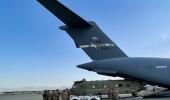The ineptness of successive American presidents, from Bush the Younger to Joe Biden the Old, combined with the cluelessness that Americans demonstrate in foreign lands, contrasts with the Chinese leadership's seemingly singular focus on the accumulation of wealth and power, asserts T N Ninan.

Charles Kindleberger, an economic historian, argued that monetary stability needed a hegemon to set the rules.
His 'hegemonic stability theory' has subsequently been applied to a broader economic canvas and even beyond economics.
It has been argued, for instance, that the instability of the period between the two World Wars was because Britain was in decline and an isolationist America not willing to step forward as the new global boss.
Since then, Americans have told themselves and others that the rules-bound global order of the past 75 years was largely their creation.
That view holds substantial truth, though it glosses over America's not infrequent deviations from agreed rules.
Today the hegemon is challenged.
The chaotic US withdrawal from Afghanistan fits into a pattern where it 'lost' Syria following a futile intervention in that country's civil war, Iraq when it dismantled local power structures after ousting Saddam Hussein in 2003, Russia when Putin took charge of a humiliated country in 2000, Iran when the US failed to anticipate Islamist irredentism in 1979, and Vietnam in 1975 (where too handing over to a local army failed as strategy).
Meanwhile, the Arab Spring withered.
It was very different a quarter century ago.
During the brief single-superpower moment that followed the collapse of the Soviet Union, articles in Foreign Affairs magazine (published by the US Council on Foreign Relations) had a triumphalist approach to the prospect of a new American imperium.
Today, the change of tone in the same magazine is striking, though some writers hold out that China's strength is oversold and that the 21st century too will be an American century.
But the ineptness of successive American presidents, from Bush the Younger to Joe Biden the Old, combined with the cluelessness that Americans demonstrate in foreign lands, contrasts with the Chinese leadership's seemingly singular focus on the accumulation of wealth and power.
So the old paradigm operates less than before.
In many countries autocrats are usurping democracies even as nationalist policies have muted globalist voices.
Chinese ascendancy has neutralised if not yet Finlandised the smaller South-East Asian nations.
Beijing's zone of influence has spread to Central Asia, while Russia on its part has asserted itself with the countries along its periphery, and become a factor in the eastern Mediterranean.
If the US loses further ground to China and Russia, the prospect is of a hegemon in relative decline.
Think-tankers speculate on the likelihood of what has come to be called the Thucydides Trap, namely war when the established power (Sparta, in ancient Greece) feels threatened by a rising one (Athens).
By one tally, 12 of 16 major power shifts have ended in war -- including World War I when Britain and Russia felt threatened by a rising Germany.
But unlike a rising Japan which felt bold enough to attack Russia in 1904 after diplomacy failed, Beijing could tell itself that open conflict is unnecessary when the chips are falling its way.
There is after all the magnet of the Chinese market.
More countries trade more with China than with the US.
The leading US businesses too have recently leaned on President Biden to re-start trade talks with Beijing.
And at least two members of the Quad are feeling the heat of the dragon's breath: Australia economically, and India both economically and militarily.
Indeed, the logic driving the Quad after years of inaction is that the US now needs its allies as much as the other way round.
That tightens the Quad's partnerships.
On the other hand, in the wake of the Afghan fiasco, the Taiwanese defence minister has said that his country will need to rely more on its own defences, less on the US.
If more US allies think that way, American hegemony is on the line.
To come back to Kindleberger, were the hegemon to lose traction during the transition phase of a power shift, how would India negotiate its way through unstable times?
Are the country's economy, military and diplomacy up to the task that lies ahead?
Feature Presentation: Aslam Hunani/Rediff.com












 © 2025
© 2025